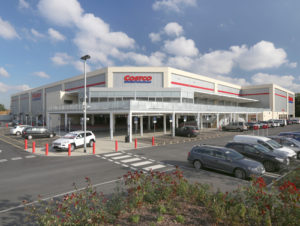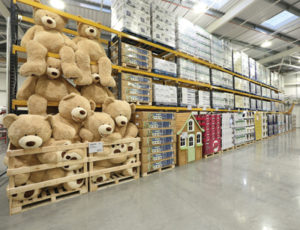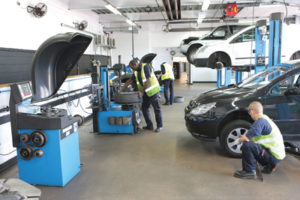Strong ethics, strong position: Steve Barnett of Costco
In a rare interview, Costco UK’s trading director Steve Barnett talks to Cash & Carry Management’s Kirsti Sharratt about what’s behind the continual growth of the business.
 There are no direct competitors to Costco in the UK – it is the only membership warehouse club – but it considers every business that sells any of its products to be a competitor and it categorically will not be beaten on price. However, this is not the only factor in its success.
There are no direct competitors to Costco in the UK – it is the only membership warehouse club – but it considers every business that sells any of its products to be a competitor and it categorically will not be beaten on price. However, this is not the only factor in its success.
Celebrating its 25th anniversary of trading in the UK, Costco has a business model that sounds simple but requires the full commitment of its employees and management to deliver. Others in the UK have tried to emulate it but have failed (namely N&P with Cargo Club), and yet it is this model that is key to Costco’s robust performance worldwide, as UK trading director Steve Barnett – who has been with the company since it first opened in the UK – emphasised when he spoke to Cash & Carry Management.
Costco first opened in the UK in 1993. How has it performed since then and what are the factors in its success?
Our business is showing growth, including like-for-like growth, and that has been the case every year since Costco was launched in the UK 25 years ago.
We have very simple ethics: obey the law, take care of our members, take care of our employees, respect our vendors (suppliers), and if we do all that we will achieve our goal of rewarding our shareholders. We live and breathe by those ethics and we have complete and utter proof that they work.
Our mission is to sell top-quality merchandise at the lowest possible price. If a member came to us saying they found a product cheaper elsewhere, we would give them a refund and then we would either remove that product from sale or beat the price. In our market we are continually having to respond to competitor activities. That is the nature of the UK market.
 There are no other membership warehouse clubs in the UK. Charging a membership fee enables us to lower the price of goods. We pass the money back to our members in savings. The more people spend, the more they save against their membership fee.
There are no other membership warehouse clubs in the UK. Charging a membership fee enables us to lower the price of goods. We pass the money back to our members in savings. The more people spend, the more they save against their membership fee.
One of our mantras is that we must maintain our core principles, values and culture. That hasn’t changed in the history of the business. We have a handbook several hundred pages long that identifies everything an employee needs to know and understand about Costco, and everything we do is aligned to that.
The companies I have worked for previously have not had the same core principles, values and culture, and I am not sure there are as many long-serving employees in any other company. My boss, Steve Pappas (Costco UK’s MD), signs a card for everyone who has worked for us for five years, 10 years, 15 years, etc, and he signs hundreds of them every year.
To what do you attribute the high level of employee retention at Costco?
There are several reasons. The first is that we like to recruit people to an entry-level position and then we train and promote from within. People can see a progression, and one of the sayings of our founders is that if you give people good jobs and pay them a good wage, good things will happen.
When people start at Costco, they are on an hourly rate. That rate rises in increments every 1,040 hours until they reach what is deemed to be a topped-out salary. Once they have been at the top level for a full year they get a bonus, and the topped-out rate also increases on a regular basis. People can really understand how much they can earn.
Most of the management in our business started in entry-level positions. I began as a buyer but that was because we were a start-up – there were nine people at head office when Costco first opened in the UK. Sue Knowles (marketing/HR director), Magan Chauhan (finance director & company secretary) and I were all part of that small, lean team. Now Costco has 6,800 employees in the UK, in our 28 branches and our head office in Watford.
How many members do you currently have in the UK and how do you go about recruiting new members?
The number is confidential. We mainly get new members by word of mouth, although we also have small marketing teams at each branch who visit businesses in their local area.
How has Costco’s UK operation developed in the past couple of years and what plans are there for the future?
We are rolling out petrol stations to our UK branches. We have 14 now, and we are working on planning applications in most of the other locations. We are the cheapest in the market for petrol – we respond to local competition – and only members can buy petrol from us.
We have also started offering car hire. In the US they have Costco Travel, which also does cruises, air fares and holidays, and we are doing a soft launch here starting with car hire.
The US also has a much wider delivered business than we have. We have offered deliveries from our Aberdeen branch for several years and we are trialling the service in a couple of other locations. It is mainly aimed at our trade members who wish to buy larger quantities – it is a wholesale-orientated delivery service.
We are always looking to offer additional services to enhance the value of membership. For example, we have optical departments and hearing aid centres in our branches, and we have approved providers of mortgages, insurance, payment processing, etc, that our trade members can access.
Apart from the services you offer, are there any other differences between Costco’s UK and US operations?
No – the business model works in all markets and we have no desire to change it. Costco is not a success because we have entrepreneurs coming in to do things differently – it’s a success because of our core principles, values and culture. We’re not revolutionary, we’re evolutionary.
The fantastic thing about Costco UK is that we have a parent company in the US that has been around a lot longer than us and it is a great testing ground – if something works over there then it’s going to work almost everywhere, whether it’s the UK, Korea, Taiwan, Japan, Mexico, Australia, France, Spain, Canada or Iceland. The markets only differ in terms of taste of product; however, because there’s a lot of globalisation of the major brands, the differences aren’t as marked as you might think.
In terms of the UK wholesale/retail market place, what is Costco’s USP?
Apart from being the only membership warehouse club, we only carry 3,800 items – of these, 1500-1800 are core lines and everything else changes on a seasonal or rotational basis. One of our greatest strengths is that we carry a number of unique products. It is a bit of a treasure hunt environment because people never quite know what they’re going to find.
 We also carry the broadest range of products of any UK business – from car tyres to jewellery, from fresh meat to wines, from TVs to clothing. Nobody offers the assortment of products that we do and we go for what we believe to be the best quality, best value item in each product category but we don’t offer a great deal of choice within the category. Every item has to stand and fall on its own merits.
We also carry the broadest range of products of any UK business – from car tyres to jewellery, from fresh meat to wines, from TVs to clothing. Nobody offers the assortment of products that we do and we go for what we believe to be the best quality, best value item in each product category but we don’t offer a great deal of choice within the category. Every item has to stand and fall on its own merits.
We run roadshows, which are part of our treasure hunt. These give us an opportunity to trial different items – they are like pop-up shops – and they offer our members enhanced value.
Why do you think there are no other membership warehouse clubs in the UK?
We try to keep things simple and straightforward, and we have the confidence to stay with our mission and do things properly. In the past, a lot of people would have said that Makro was the closest thing to Costco and that would have been a fair summary, but Makro never maintained the level of detail on quality, value and the treasure hunt.
We have not changed our stance and the fact of the matter is if you give people great quality merchandise at the lowest possible price they will want to shop with you and continue to shop with you. What’s more, our members know that if they have a problem with a product we will give them a refund, no questions asked.
What are the most expensive and unusual products Costco has sold during your time with the business?
The most expensive product sold worldwide by Costco was a £250,000 Andy Warhol artwork; in the UK it was a £45,000 diamond ring. The most unusual item sold by Costco worldwide is coffins but we can’t find a way to sell them in the UK – we have tried to but it’s a difficult market here, it’s so controlled. However, we have sold full-size elephant and giraffe sculptures made from scrap metal in Kenya!
How is your own-brand Kirkland Signature performing, and what plans do you have to develop your own-brand offering?
 Our Kirkland Signature range features around 500 food and non-food lines and is extremely successful. We believe it is the best value product that we offer our members. The quality is as good, if not better, than the national brands and we don’t profiteer on it. It will continue to grow in terms of sales and the number of lines. I think it is unlikely we would introduce another own-brand.
Our Kirkland Signature range features around 500 food and non-food lines and is extremely successful. We believe it is the best value product that we offer our members. The quality is as good, if not better, than the national brands and we don’t profiteer on it. It will continue to grow in terms of sales and the number of lines. I think it is unlikely we would introduce another own-brand.
Costco worldwide sells huge volumes of Kirkland Signature products and we have to make sure that the volumes are sufficient to meet demand but also that the products are ethically sourced and sustainable. We have a corporate team in the US who spend a great deal of time ensuring those principles are met – we have a lot of corporate responsibility.
For example, where we work with developing countries, we carry out factory audits to ensure there are no under-age workers, that people are well paid, that their living conditions are good if they live on site – there’s a whole raft of conditions that our supply base has to agree to and these come under the Costco code of conduct.
This is important because we don’t want people to think that an item is only cheap in Costco because we are paying the people who make it two and six.
Costco is known for having good relationships with its suppliers (vendors). How much is this a factor in its success?
Our code of ethics insists that we respect our vendors. That even comes down to the quality of a display in our warehouses because if we are not displaying their products correctly we would consider that as being unfair to them.
Our policy also expressly prohibits the acceptance by any Costco employee of any gratuity from a vendor with whom we are currently doing business or who we are considering for future business. This is part of our code of ethics. We are so intent on maintaining our core principles, values and culture, and that’s what makes us a success. Everybody knows where they stand, from our employees to our vendors.
What impact have technological advances had on Costco’s business?
We have always had amazing systems of recording what we sell, how we sell it, when we sell it and who buys it, so we have always had an incredible amount of data at our disposal. In that aspect we are very advanced and we are continually evolving our systems to ensure we stay at the forefront of the industry.
The secret with data and technology is how to use it to truly enhance a business, rather than letting it dictate how a business operates. There are cases where some businesses have been thrown off track by data whereas we are careful to use it in the right way.
In late 2012 we introduced our online business, www.costco.co.uk, which focuses primarily on non-food. We are very happy with it – it has shown high year-on-year growth.
Costco contributes a lot to charity. In the UK, which causes do you support and how do you raise funds?
Charitable giving is a big part of Costco’s business worldwide. In the UK we are committed supporters of Children in Need. Each year we hold a golf day and dinner at Celtic Manor, which is our main fundraising event, involving over 700 employees and vendors. Our branches and employees also run their own fundraising activities. Over the last 19 years, Costco UK has raised £7.2 million for Children in Need.
Besides this national effort, each branch has a budget to support activities in local schools and charities, and we also have a programme working with United Way whereby we will contribute to the same charity donated to by our employees via our payroll system.
Costco UK in numbers:
£2.11 billion turnover (year to 28 August 2016)
28 branches (of 761 worldwide)
1 branch in Iceland, managed by Costco UK
6,800 employees
14 petrol stations at UK branches
3,800 lines stocked in each branch
500 Kirkland Signature own-brand lines
£7.2 million raised for Children in Need over the last 19 years
£45,000 diamond ring – the most expensive item sold by Costco UK
Tel: Costco UK (01923) 213113

